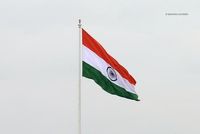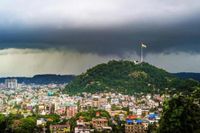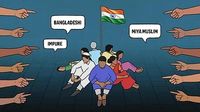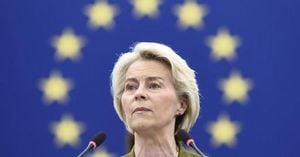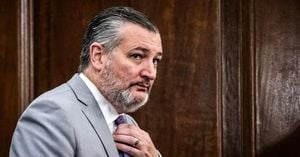On August 15, 2025, India marked its 79th Independence Day, an occasion steeped in both celebration and reflection. The annual commemoration, which began with the nation’s liberation from colonial rule in 1947, is a reminder of the enduring vision set forth by India’s founding fathers—a vision built on the ideals of freedom, liberty, equality, justice, and fraternity. Yet, as the country gathered to observe this milestone, the air was thick with questions about whether those promises have truly been fulfilled.
According to Madras Courier, the Declaration of Independence in 1947 was not just a statement of freedom from colonialism, but a pledge to build a just society where every individual, regardless of caste, religion, or creed, could claim equal dignity and opportunity. The architects of modern India envisioned robust institutions—a strong judiciary, a free press, and a civil service acting in the public interest—as the backbone of this democracy. However, recent years have seen these very institutions come under strain, raising concerns about the health of the world’s largest democracy.
Independence Day is also a time to honor the collective effort of countless Indians who fought for freedom, transcending religious, caste, regional, and political divides. As highlighted in The Indian Express, this unity in diversity remains one of India’s greatest strengths. Yet, the Prime Minister’s address on August 15, 2025, drew criticism for not sufficiently reinforcing this spirit of unity. Instead, the speech was viewed by some as partisan, with the government accused of downplaying the contributions of previous leaders and political parties.
The Prime Minister’s remarks on technological progress, for instance, were seen by critics as an attempt to discredit earlier governments. The article in The Indian Express points out that this narrative overlooks the immense milestones achieved under past Prime Ministers: Jawaharlal Nehru’s establishment of ISRO, IIMs, IITs, AIIMS, HAL, DRDO, and the Bhabha Atomic Research Centre; Indira Gandhi’s role in sending Squadron Leader Rakesh Sharma to space, ordering underground nuclear tests, and initiating seabed mining; Rajiv Gandhi’s push for the telecom and IT revolution; and Manmohan Singh’s government connecting over 250,000 gram panchayats through broadband. These achievements, the article argues, laid the groundwork for India’s transformation into a technological powerhouse.
Yet, as the nation celebrated its progress, the specter of unfinished promises loomed large. The founding vision of equality for all remains elusive. As of 2023, approximately 24% of India’s population continued to live below the poverty line, with most of the poor hailing from Dalit or ‘untouchable’ communities, according to Madras Courier. Despite decades of affirmative action and legislative reform, caste-based discrimination persists, affecting access to education, jobs, and political power. The constitutional guarantees of equality and protection for marginalized groups are, for many, still aspirations rather than realities.
This struggle is compounded by recent concerns over the government’s approach to social justice. The Indian Express notes that the BJP-led government has been criticized for its handling of issues affecting Scheduled Castes (SCs), Scheduled Tribes (STs), and Other Backward Classes (OBCs). Scholarships for these groups have been drastically reduced, and appointments for reserved posts in central universities have faced significant delays. Government figures reveal that in 2025, 83% of professor-level posts reserved for STs, 80% for OBCs, and 64% for SCs remained unfilled—a stark indicator of systemic neglect.
Regional disparities also continue to mar the country’s development. Several states lag behind in economic growth, and center-state relations have been strained by budget allocations perceived as politically motivated. Critics argue that, to truly secure the rights and interests of backward communities and regions, the government must move beyond rhetoric and deliver substantive change on the ground.
India’s founding fathers also envisioned a democracy where institutions would act as checks on power. Yet, according to Madras Courier, these institutions have come under increasing pressure. The judiciary, once a symbol of impartial justice, now faces mounting questions about its independence. The backlog in the courts is staggering: in 2023, more than 45 million cases were pending, with average resolution times stretching into years or even decades. Moreover, political influence in judicial appointments has raised alarms about the erosion of judicial autonomy—a development that threatens the very foundation of the rule of law.
The free press, another pillar of democracy, has not been spared. India’s ranking in the 2023 Press Freedom Index, compiled by Reporters Without Borders, plummeted to 150th out of 180 countries. This decline is not merely symbolic; it reflects a tangible weakening of the press’s ability to hold those in power to account. Journalists have faced threats, arrests, and harassment for exposing corruption or government mismanagement, undermining the public’s right to information and the very essence of democratic accountability.
Religious polarization has further complicated India’s social fabric. The secular vision of the republic—where religion would not define state policy—has been challenged by the growing use of religious rhetoric in politics. As Madras Courier observes, leaders have increasingly used religion to mobilize voters and divide communities, threatening the pluralistic democracy envisioned in 1947. This trend risks undermining the inclusive ethos that has long been a hallmark of Indian society.
India’s international posture has also come under scrutiny. The Indian Express highlights the government’s reluctance to publicly deny the U.S. President’s claim of brokering a ceasefire between India and Pakistan during Operation Sindoor and the Pahalgam terrorist attacks. Traditionally, India has maintained that its bilateral issues with Pakistan are not open to foreign intervention. The lack of a clear denial, coupled with questions about the government’s handling of security lapses and international support, has fueled debate about India’s diplomatic stance and accountability mechanisms.
As the nation reflects on its journey, both articles agree on one point: Independence Day is not just a celebration of past achievements, but a call to action. It is a day to honor the sacrifices of previous generations and to recommit to the ongoing task of nation building. The true legacy of 1947, as Madras Courier eloquently puts it, lies not in the freedoms already attained, but in the freedoms still to be secured for all.
With its rich history of resilience and unity, India stands at a crossroads. The challenges are formidable—poverty, discrimination, institutional erosion, and social division—but so too is the nation’s capacity for renewal. As the tricolor fluttered across the country on August 15, 2025, citizens were reminded that the promise of independence is not a relic of the past, but a living mandate for the future.
